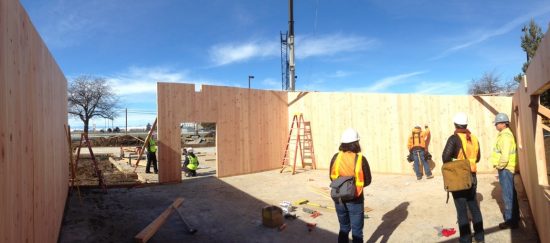Would create thousands of jobs, with a record $1 billion in funding to build schools
OLYMPIA—The state construction budget proposed by the House of Representatives would invest more than $1 billion into building schools in every corner of Washington state.
“This budget will put people to work from Aberdeen to Spokane, building local schools for our 1.1 million students,” said Rep. Steve Tharinger (D-Sequim), chair of the House Capital Budget Committee. “It’s a bipartisan budget, with Democrats and Republicans working together to find ways of making our communities stronger in every corner of the state.”
Additional education investments in House Bill 1075 include:
- $15.5 million to build Early Learning facilities
- $30 million for rural and distressed K-12 schools
- $800 million for state colleges and universities, with $433 million for community and technical colleges
- $15 million for science, technology, engineering and math (STEM) grants at K-12 schools

“The Seattle-Tacoma-Everett area is booming, but out in timber and farm country, families and businesses are still fighting to recover from the Great Recession,” Tharinger said. “To help those communities thrive, this budget gives rural Washington a boost.”
Investment in rural parts of Washington include:
- $203 million for the Public Works Assistance Program, which helps local governments build critical infrastructure such as water and stormwater projects, roads and bridges
- $80 million for Washington Wildlife and Recreation Program (WWRP)
- $5 million to bring broadband to timber and farm country
- $18 million for Forest Health/Wildfire Prevention, a vital need given that the state has spent hundreds of millions of taxpayer dollars in recent years to fight wildfires
- $54 million for State Parks
- $160 million for Clean Drinking Water and Centennial Clean Water programs
- $40 million for Stormwater Financial Assistance
Part of the philosophy of the state construction budget is to get maximum value for taxpayers by leveraging as much local and federal funding as possible for each project. The proposed capital budget leverages more than $600 million in additional non-state funding just in the natural resources area alone. The school construction funding also requires a local match by school districts.
In cooperation with new investments in the House operating budget, the construction proposal would put $165 million toward fixing the state’s mental health crisis. That funding includes:
- $76 million for Community Behavioral Health capacity
- $58 million for construction and renovation at state facilities
- $24m for supportive housing for the chronically mentally ill
Finally, the budget puts serious funding toward housing, clean energy, arts and dental care:
- $105 million for Housing
- $65 million for Clean Energy, Solar, and Energy Efficiency
- $49 million for Arts, Building Communities, and Youth Recreation programs
- $14 million for Dental capacity and residency
The two-year construction budget keeps $105 million in reserve for a supplemental capital budget in 2018.
“Families First is the phrase that guided us when writing the state operating budget and it’s the same value system when it comes to the capital budget,” Tharinger said. “We’re working together, as Democrats and Republicans, to build a better Washington for our kids and grandkids.”
Tharinger said the next steps are a public hearing on the budget, then a vote in committee and a vote on the House floor. Once the budget has passed the House, a final bipartisan construction budget will be negotiated between the House and Senate.
